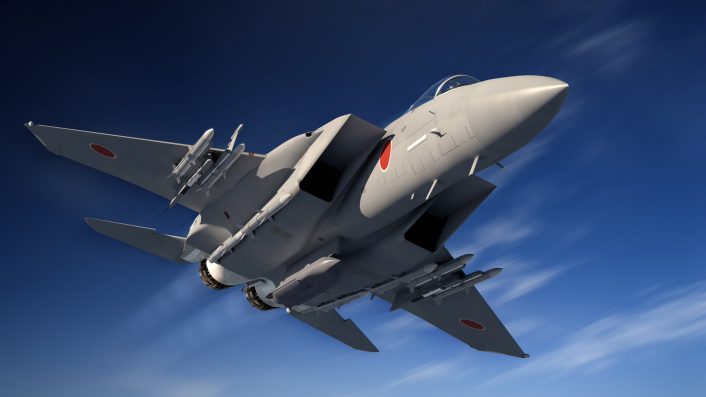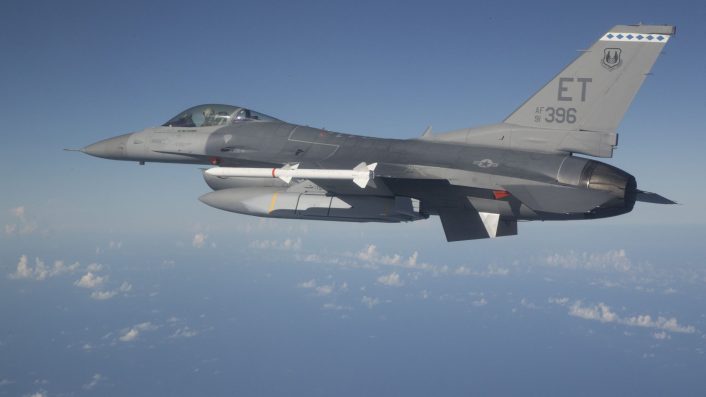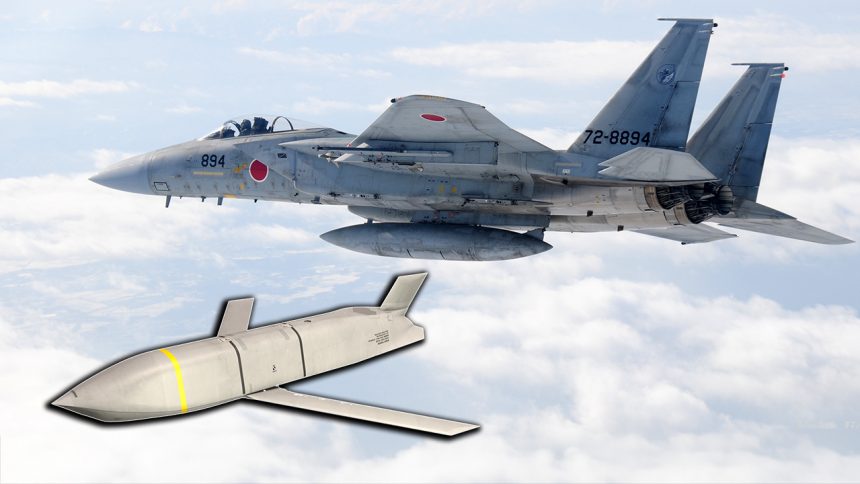After the acquisition of 50 AGM-158B JASSM-ER missiles last year, Japan has now been granted the approval for 16 additional AGM-158s, reinforcing the JASDF’s long-range stand-off strike capabilities of the F-15J, F-35 and possibly other assets.
The United States’ DSCA (Defense Security Cooperation Agency) announced on Jan. 15, 2025, the approval of a possible sale of 16 more AGM-158B/B-2 JASSM-ER (Joint Air-to-Surface Standoff Missile-Extended Range) weapons to Japan in a $39 million deal. This development follows a Jul. 4, 2024 contract by the Japan MoD for the acquisition of 50 AGM-158B JASSM-ER missiles, which were approved in an FMS (Foreign Military Sale) a year prior, on Aug. 28, 2023.
The missiles are meant for the JASDF’s (Japan Air Self-Defense Force) F-15J and F-35A/B aircraft as a long-range air-launched surface-strike weapon, according to the statement. The statement specifically mentions “including but not limited to the F-15J and F-35A/B,” although other platforms expected to employ the weapon are unknown as so far Japan only acknowledged the F-15J for the role.
However, Japan previously considered “mounting long-range missiles,” such as the AGM-158, on its 15 Kawasaki C-2 transport planes to “improve its standoff defense capabilities,” in what is considered an equivalent of the USAF’s Rapid Dragon project. Another possible launching platform could be the Mitsubishi F-2 fighter, based on the F-16 which is itself capable of employing the weapon.
The deal also includes AGM-158 JASSM DATM (Dummy Air Training Missiles); containers; JAGR (JASSM Anti-Jam GPS Receivers); support, testing and maintenance equipment; spare parts; and all classified, unclassified technical documentation and software. The contracts come amid increasing tensions with China, North Korea and Russia in the western Pacific, when the U.S. has been firming its own alliance with Japan, South Korea, Taiwan and the Philippines.
“This proposed sale will support the foreign policy goals and national security objectives of the United States by improving the security of a major ally that is a force for political stability and economic progress in the Indo-Pacific region,” the DSCA added.
The U.S. State Department has greenlit a potential foreign military sale to Japan, featuring Joint Air-to-Surface Standoff Missiles with Extended Range [JASSM-ER] and related gear, with an estimated price tag of $39 million.Defense Security Cooperation Agency notified Congress pic.twitter.com/RAYyLkJ8BA
— Valhalla (@ELMObrokenWings) January 16, 2025
AGM-158 variants and Japan’s F-15J upgrades
The AGM-158B JASSM-ER is the baseline extended range version of JASSM, whose AGM-158B-2 and AGM-158B-3 variants have different and upgraded electronic circuitry, guidance, navigation and seeker systems. According to The War Zone, the AGM-158D JASSM-ER has a WDL (Weapon Data Link) capability that allows retargeting/retasking the missile mid-flight. The capability was mentioned in the Air Force’s Fiscal Year 2025 budget documentation and is still under development.
The AGM-158C is meanwhile the anti-ship variant of the missile, called the LRASM (Long-Range Anti-Ship Missile). In Sep. 2024, the U.S. military released the first images of the AGM-158C LRASM being carried in flight by an F-35C test aircraft from Naval Air Station (NAS) Patuxent River, Maryland.
Prior to that, Lockheed Martin unveiled a mock-up of the AGM-158 Extreme Range (XR) during the U.S. Air Force’s Air, Space and Cyber 2024 Conference. The JASSM’s variants and the LRASM are the mainstay of U.S. and partner nations’ long-range standoff airborne strike, capable of being employed by the F-35 (carried externally), F-15, F/A-18, B-52, F-16 and B-1B.

As reported by The Aviationist, 68 of the JASDF’s F-15J/DJs are poised to be upgraded to the F-15 Japan Super Interceptor standard in a $450 million deal between the AFLCMC (Air Force Life Cycle Management Center) and Boeing. The JSI upgrade comprises the Raytheon APG-82(v)1 AESA (Active Electronically Scanned Array) radar, Honeywell’s ADCP II (Advanced Display Core Processor II), and the BAE Systems AN/ALQ-250 EPAWSS (Eagle Passive Active Warning Survivability System).
These technologies are also present in Boeing’s F-15EX Eagle II, the USAF’s newest fighter, and upgrade packages for F-15s operated by other countries like South Korea. As per the World Air Forces 2024 report, the JASDF has 155 single seater F-15J and 44 two-seater F-15DJ, part of which were upgraded through the Japan-Multi-Stage Improvement Program (J-MSIP).
The advanced missiles, combined with the F-15J Super Interceptor’s powerful radars, sensors and EW (Electronic Warfare) capabilities would suit the complex and highly synchronized, coordinated strikes required against PLA Navy and North Korean sea and land targets. The tactical actions would need both pre-planned and improvised operations, both of which would rely upon accurate aerial and space surveillance, heavy payload aerial platforms, long-range missiles, high-situational awareness and significant electronic jamming and denial of the electro-magnetic space.
7 Dec 1981 – Introduction: Mitsubishi F-15J with Japan Air Self-Defense Force produced under license by Mitsubishi Heavy Industries. subsequent F-15DJ and F-15J Kai variants were also produced. Japan is the largest customer of the F-15 Eagle outside the United States pic.twitter.com/7EuUfxvQ1Q
— Chris Bolton (@CcibChris) December 7, 2023
Japan has been rearming
Kyodo News tied the latest JASSM deal to the Japanese government’s late-2022 defense white papers calling to “acquire so-called counterstrike, or enemy base strike, capabilities in a major policy shift under the country’s war-renouncing Constitution.” Early in January this year, the U.S. State Department approved another FMS (Foreign Military Sale) to Japan of 1,200 AIM-120D-3 and AIM-120C-8 AMRAAMs (Advanced Medium-Range Air-to-Air Missile) in a staggering $3.64 billion project.

Prior to that, Japan’s ATLA (Acquisition, Technology and Logistics Agency) released on Jul. 4, 2024, a video of the test of its first hypersonic weapon that it had conducted on Mar. 23, 2024 in the U.S. This was followed by Japanese military authorities revealing on Dec. 6, 2024 the first images of the Type-12 SSM’s test fires that took place in a series of demonstrations between October and November of that year.









